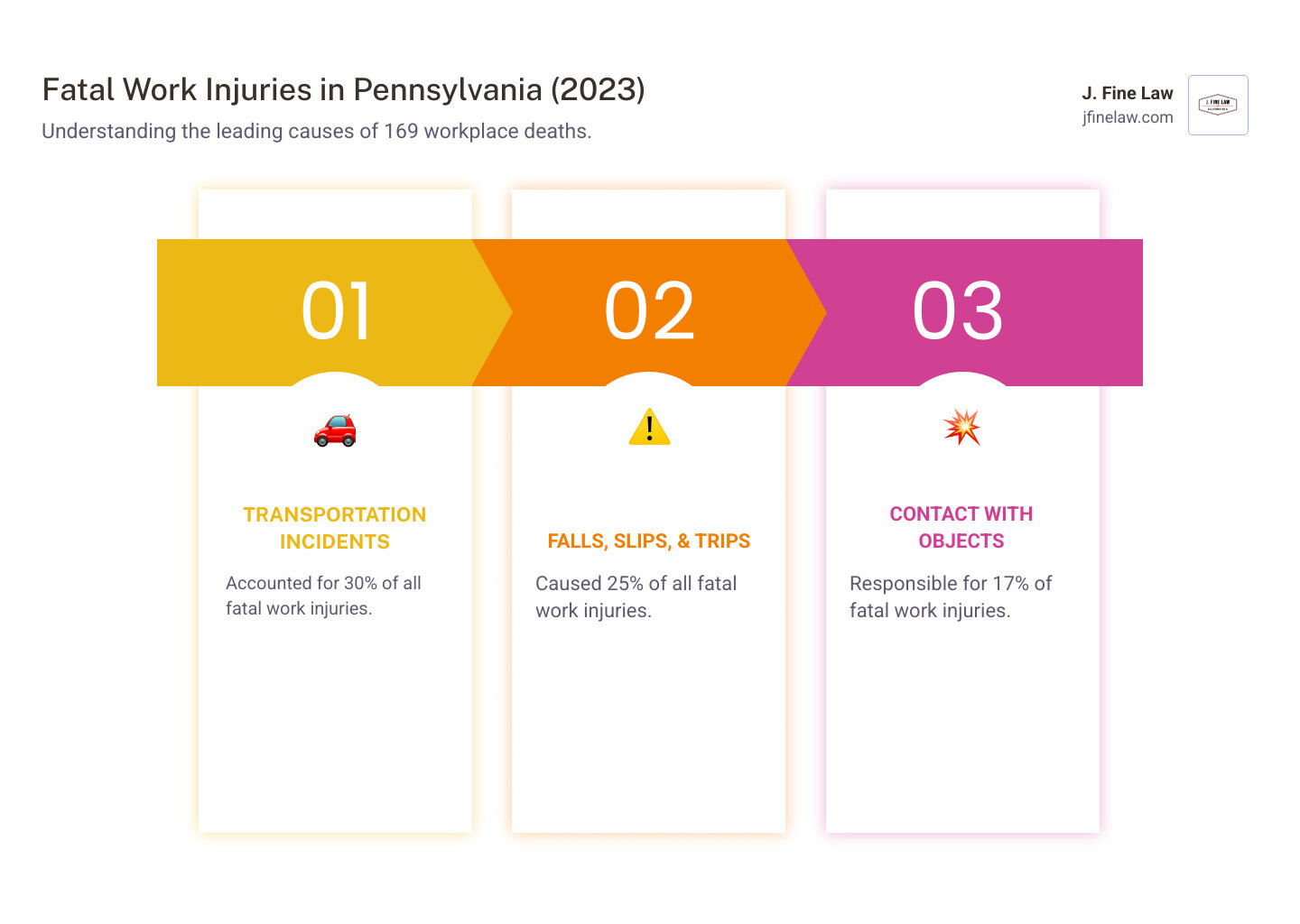Why Pennsylvania Work Injury Cases Are More Complex Than You Think
If you’ve suffered a Pennsylvania work injury, understanding your rights under the state’s workers’ compensation system is critical. While Pennsylvania’s system is “no-fault,” meaning you can get benefits regardless of who caused the accident, the process is filled with complexities.
Quick Facts About Pennsylvania Work Injuries:
- Covered Injuries: Specific incidents, repetitive motion injuries, and aggravation of pre-existing conditions.
- Reporting Deadline: 21 days for full benefits, 120 days absolute maximum.
- Benefits Available: Medical expenses, wage loss (2/3 of average weekly wage), specific loss benefits.
- No-Fault System: You’re generally covered even if you contributed to the injury.
- Filing Deadline: 3 years to file a claim petition if denied.
The reality is stark. In 2023, Pennsylvania recorded 169 fatal work injuries, with transportation incidents and falls accounting for over half of all workplace deaths. These statistics represent families facing devastating losses while navigating a difficult legal system.
The claims process involves strict deadlines, specific medical treatment rules, and potential disputes with insurance companies. Missing a deadline or a rule can jeopardize your benefits. I’m Jason Fine, and with over 25 years of experience, my team has helped thousands of injured workers steer this system and secured millions in settlements.
Navigating Your Pennsylvania Work Injury Claim
When you suffer a Pennsylvania work injury, the path forward can seem confusing. Pennsylvania’s workers’ compensation system exists to protect you, but you need to know how to steer it successfully.
What’s Covered? Types of Injuries and Diseases
A Pennsylvania work injury isn’t limited to a single, dramatic accident. The Pennsylvania Workers’ Compensation Act is a no-fault system that covers a wide range of conditions, even if you made a mistake that contributed to your injury.
Covered injuries include:
- Specific incident injuries: Sudden events like a slip and fall or being struck by an object.
- Repetitive motion injuries: Conditions that develop over time, such as carpal tunnel syndrome from typing or back pain from frequent lifting.
- Aggravation of pre-existing conditions: If your job duties make a prior condition, like arthritis, significantly worse, it is a compensable injury.
- Occupational diseases: Illnesses caused by workplace exposure, such as black lung disease for miners or certain heart conditions for firefighters.
- Hearing loss: Gradual or sudden hearing damage from workplace noise.
Common injuries include falls, back injuries, burns, cuts, fractures, head injuries, and amputations. Importantly, your injury doesn’t have to happen on company property. As long as you were acting “in the course and scope of employment”—doing something for your employer’s benefit—you are likely covered. For detailed information, see the official guidance on What is a Work-Related Injury and Occupational Disease?
The Claims Process: A Step-by-Step Guide
Knowing what to do after a Pennsylvania work injury can prevent unnecessary stress and protect your claim. Here are the critical steps:
- Notify your supervisor immediately. This is the most crucial first step. Report your injury right away, even if it seems minor. Follow up in writing (email, incident report) to create a paper trail. You must report within 120 days to preserve your rights.
- Seek medical treatment. Your health is the priority. For other injuries, your employer may provide a “panel” of designated doctors. If they provide a valid list of at least six providers, you must treat with one of them for the first 90 days. If they don’t, you can see your own doctor from day one. Always tell your doctor the injury is work-related.
- Understand your employer’s and the insurer’s roles. Your employer must file a “First Report of Injury.” Their insurance company then has 21 days from when you miss work to decide on your claim. You will receive either a Notice of Compensation Payable (accepting your claim) or a Notice of Compensation Denial. A denial is not the end of your case. Your employer cannot legally fire you for filing a workers’ compensation claim. You can find more details in the Pennsylvania Workers’ Compensation Act.
Critical Deadlines for Reporting and Filing
In workers’ compensation, deadlines are absolute. Missing them can mean losing your right to benefits entirely.
- The 21-Day Notice Rule: To receive benefits from your first day out of work, you must notify your employer of your injury within 21 days.
- The 120-Day Absolute Deadline: You must report your Pennsylvania work injury to your employer within 120 days. If you fail, you will lose all rights to benefits.
- The Three-Year Statute of Limitations: If your claim is denied, you have three years from your injury date to file a “Claim Petition” with a Workers’ Compensation Judge.
Prompt action protects your rights. Insurance companies know these deadlines and will not remind you when time is running out.
Understanding Your Workers’ Compensation Benefits
If you’re hurt and can’t work, these benefits provide a crucial financial safety net.
- Wage Loss Benefits: If you are unable to work, you receive two-thirds of your pre-injury average weekly wage, paid weekly and tax-free.
- Medical Benefits: Covers all “reasonable and necessary” medical treatment for your work injury, including doctor visits, therapy, and prescriptions.
- Specific Loss Benefits: If you lose a body part or its permanent use, you receive a set number of weeks of compensation, regardless of whether you can work.
- Disfigurement Benefits: Provides compensation for permanent scars or disfigurement to your head, face, or neck.
- Death Benefits: Provides financial support and burial expenses to dependents if a work injury results in death.
Workers’ compensation does not cover “pain and suffering” damages against your employer, but these benefits are vital for your recovery.
What to Do if Your Pennsylvania Work Injury Claim is Denied
Receiving a denial letter is disheartening, but a denial is not the end of your story. Your next step is to file a Claim Petition with the Pennsylvania Bureau of Workers’ Compensation. This formal legal document starts the litigation process and must be filed within the three-year statute of limitations.
The case will be assigned to a Workers’ Compensation Judge. You will need to present evidence, including medical records and doctor testimony, to prove your injury is work-related and disabling. This is a stage where experienced legal representation is invaluable.
Your Rights as an Injured Worker in a Pennsylvania Work Injury Case
Knowing your rights empowers you to get the benefits you deserve.
- Protection from Retaliation: Your employer cannot fire, demote, or discriminate against you for filing a legitimate workers’ compensation claim.
- Job Protection: You may have job protection under the Family and Medical Leave Act (FMLA). If you and your employer qualify, FMLA provides up to 12 weeks of unpaid, job-protected leave. Learn more at the Family and Medical Leave Act (FMLA) page. Union contracts may also offer additional protections.
- Right to Legal Representation: You have the right to hire an attorney at any point. You should strongly consider it if your claim is denied, your benefits are stopped, or you’re offered a settlement. Attorney fees are typically capped at 20% of your award and paid from your benefits, so there are no upfront costs.
- Third-Party Liability Claims: If someone other than your employer or a co-worker caused your Pennsylvania work injury, you may have a separate lawsuit against them. These claims can recover damages for pain and suffering, which workers’ comp does not cover.
Securing Your Future After a Workplace Accident
A workplace injury can be overwhelming, but you are not alone in this fight. By understanding your rights and taking the right steps, you can regain control.
Remember these key points:
- Your injury is likely covered. Pennsylvania’s system is broad, covering everything from sudden accidents to repetitive motion injuries.
- Time is critical. Report your injury within 21 days for full benefits and never miss the 120-day absolute deadline.
- A denial is not the end. You have three years to file a Claim Petition and fight for your benefits.
- Your employer cannot retaliate against you for filing a claim.
Keep copies of everything: incident reports, medical records, and all communications. The insurance company has a team working to minimize your claim; proper documentation and experienced legal counsel level the playing field.
At J. Fine Law, we’ve secured over $50 million in settlements for injured workers across Pennsylvania. Our 98% success rate and rapid attorney response mean you get the answers and advocacy you need, when you need them.
Your Pennsylvania work injury doesn’t have to define your future. With prompt action and strong legal representation, you can secure the benefits you need to focus on your recovery.
If you’re ready to learn how we can help, Learn more about how we handle workplace accident cases in Pennsylvania. Your future is worth fighting for.




